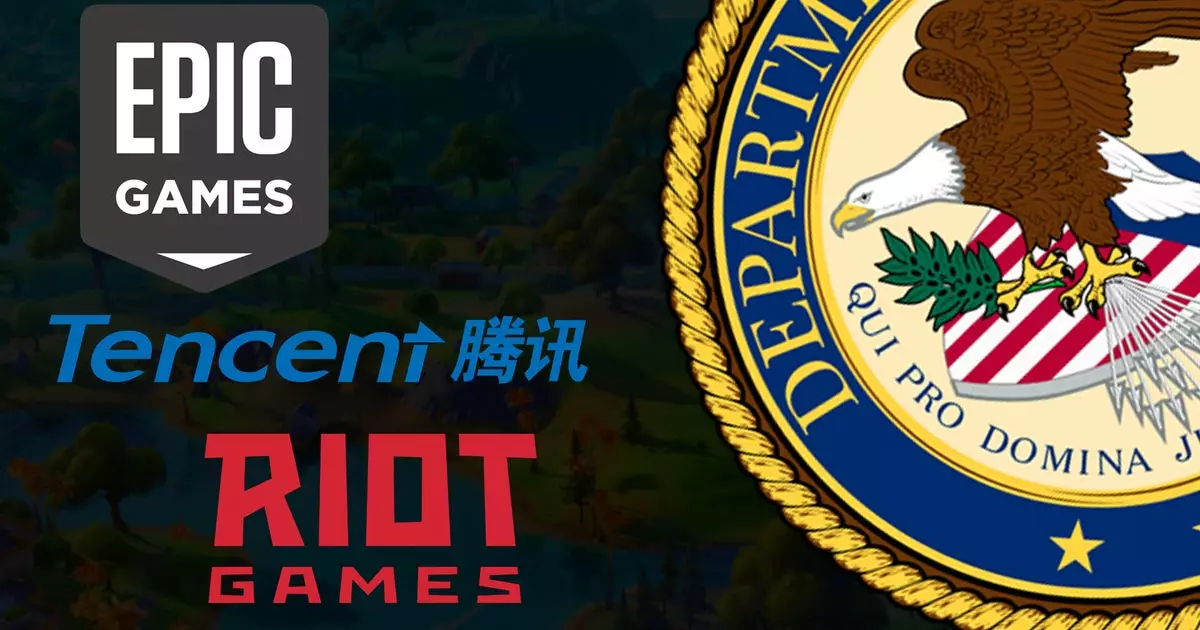The complexities of corporate governance have come into sharp focus as Epic Games finds itself amidst an antitrust investigation led by the U.S. Department of Justice (DoJ). This scrutiny has prompted the resignation of two key board members, reflecting an ongoing battle to maintain competitive integrity in a rapidly consolidating video game industry. The situation encapsulates not only the challenges associated with corporate alliances but also the broader implications of antitrust laws designed to prevent monopolistic practices.
The resignation of Ben Feder and David Wallerstein from Epic’s board signals a critical moment for the gaming giant. Appointed by Tencent, which holds a minority stake in Epic, their presence on the board raised red flags given Tencent’s substantial ownership of Riot Games, a direct competitor within the sector. The dissonance in corporate governance sparked concern over potential conflicts of interest and violations of the Clayton Act, which prohibits directors from serving on the boards of competing companies.
This development suggests that the boardroom is not merely a venue for strategic decision-making but a hotbed of legal complexities and ethical dilemmas. The DoJ’s press release explicitly outlined that these resignations were necessitated by an investigation into potential antitrust violations, highlighting the fragile equilibrium companies must maintain when traversing alliances and ownership structures.
At the heart of this controversy is Tencent’s dual role as both an investor in Epic Games and a controlling entity of Riot Games. The parallels drawn between this situation and hypothetical conflicts—such as a significant Pepsi executive attending Coca-Cola meetings—underscore the ethical quagmire at play. The implications of allowing an individual associated with a competing company to influence another’s strategy can undermine fair competition, leading to potentially anti-competitive behavior that regulators are keen to monitor.
The departures of Feder and Wallerstein, both seasoned executives with deep connections within the gaming industry, are emblematic of a shifting landscape where scrutiny over corporate governance is intensifying. Tencent’s obligation to revise its shareholder agreement with Epic to preclude appointing directors emphasizes the need for clarity and transparency in corporate affiliations.
Antitrust regulations serve as a crucial bulwark against corporate consolidation and monopolization, especially in industries like gaming, where innovation and competition drive consumer choice. The situation echoes previous antitrust actions in the industry, such as the scrutiny faced by Valve and Microsoft during their respective legal battles. These cases illustrate the necessity of maintaining a competitive marketplace, where no single entity can dominate and dictate terms.
Involving high-stakes players like Tencent, Epic, and the implications for Riot Games prompts a reevaluation of how these alliances might affect both market dynamics and consumer experience. The DoJ’s investigation aims to ensure that the principles underpinning antitrust laws are upheld, preventing any entity from solidifying a dangerous concentration of market power.
The current upheaval at Epic Games serves as both a cautionary tale and a learning opportunity for other companies navigating the intricacies of corporate governance and antitrust compliance. It highlights the necessity for rigorous adherence to legal frameworks that safeguard competition and fairness within the industry. As Epic reshuffles its boardroom dynamics and Tencent recalibrates its approach to governance, the outcomes will undoubtedly reverberate throughout the gaming landscape, shaping the future of corporate relationships amidst the ever-evolving demands of a global market.
In an era where corporate actions can have far-reaching consequences, the message is clear: navigating the complexities of ownership, governance, and competition requires not just strategic acumen but also a commitment to ethical practices that respect the spirit of fair play. The resignation of these directors illustrates the tangible impact of antitrust regulations, signaling that vigilant oversight remains essential to sustaining a healthy competitive ecosystem.


Leave a Reply